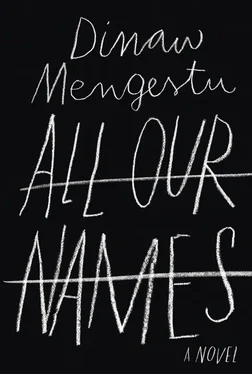He was looking at the suit.
“Do you mind if I wear it? It was the last thing I bought in Nairobi. I don’t want to fold it into such a small suitcase.”
I wrapped my arms around him from behind and held my face against his back. I felt the urge to tell him I loved him; it wasn’t the first time I’d had that thought, but it was the first time I was certain it was true. I pushed him onto the part of the bed that wasn’t covered by his suit, and took off my towel as I undressed him.
He reached for a condom, but I pulled his arm back and placed it around me.
“Is this because of the toothbrush?”
“Yes.”
He tried to pull me off him before he came, but I refused to let go. I looked ahead and had a sense of the doubt and anxiety that would follow, but when I looked beyond that for regret, I found none. I stayed on top of him for as long as possible. I saw him preparing to apologize.
“There is nothing to be sorry about,” I told him.
I made eggs while Isaac showered and put his suit on. When I first met him I had wanted to laugh at the idea that someone would get so dressed up to come to this town, where most men wore suits only to church, and then just for weddings and funerals. I had missed how handsome he looked in gray, how a suit aged him just slightly beyond his twenty-odd years to a point better matched to the sometimes grave, formal aura that surrounded him.
“I thought you didn’t touch eggs,” he said.
“I learned while you were away.”
I sat on the kitchen counter while he ate his breakfast at the table. I couldn’t help thinking of the hundreds of times I had watched my mother sit next to my father as he did the same. His daily breakfast consisted of two eggs, fried or scrambled, with bacon and toast on the side. She nervously watched him eat from her side of the table, as if she knew that it was merely a matter of time before there would be a final breakfast; it would never be acknowledged as such, and so she rehearsed the end daily for years in order to soften the blow.
Here was another difference between us: I knew the end was near. I was making it, and trying to devour every moment left.
Before we left, I asked Isaac if he was certain he had packed everything he needed for a long trip. “Just in case I kidnap you and you never come back.”
He held up his suitcase. “I’ve never had much to leave behind,” he said.
I didn’t say where we were going next, and Isaac didn’t ask. We skirted the center of town, drove past the new shopping malls to the eastern edge of Laurel, where my mother and I lived. I had never taken Isaac to that part of town, and I could tell from the way he stared out the window at the houses, which were larger than most homes in Laurel and were graced with wide, circular porches and acres of grass to look out upon, that this was new to him.
We pulled into the fourth house we passed.
“This is yours?” Isaac asked me.
I thought of it as my home, but never as mine. I don’t think any of us who lived there had any strong feeling toward it. My parents were the second people to own it, and I never gave much thought to what I would I do when I inherited it.
“I live here,” I said, “but it’s my mother’s house. My father didn’t want anything to do with it after the divorce.”
I asked him if he wanted to come in with me while I packed. He peered through the windshield as if trying to gauge the reception that would be waiting for him on the other side of the door. I knew better now than to guess what it would be.
“Is it okay if I just wait in the car?”
It was and it wasn’t, but I said yes, because I owed him that.
The front door was already half open. I knew from experience that my mother would have parted the curtains in the living room or in her bedroom as soon as she heard a car pull into the driveway. Still, I was taken aback at seeing her standing on the other side of the door, in an ankle-length blue floral dress that she used to say made her look matronly, as if she were hiding children and possibly some pies underneath the hem. She didn’t know what to do with her arms and hands. She unfolded and refolded them in the time it took me to enter and close the door.
“I heard your car from the kitchen,” she said.
“I was going to call and tell you I was coming.”
“This is still your home, Helen. Why would you ever do that?”
For all the love and affection that existed between us, we rarely hugged. Our gestures of affection had become increasingly girlish — we squeezed hands; occasionally, my mother held my forearm; I often caught her staring at me, waiting for me to notice she was watching me closely. I thought of that when I held my hand out to her. She took it, and I led her to the windows that looked out onto the driveway. The curtain was halfway parted.
“That’s the man I’ve been seeing,” I told her. “His name is Isaac.”
She didn’t look long; she had seen him as soon as we arrived and knew who he was to me.
“Does he always wear a suit?” she asked me.
“Only on special occasions.”
She gasped. She held her hand to her mouth as if that could hide it. Only then did I understand how she had interpreted “special occasion.” I began to laugh, harder than I should have.
“It’s not what you think,” I told her. “All we’re doing is driving to Chicago.” When that failed to calm her properly, I promised her that no other special occasion had been planned, or considered.
She moved away from the window. Her hands were confused again, twirling and tugging frantically.
“Is he coming in?”
“I asked him to, but he said he preferred to wait in the car.”
Her instincts for proper behavior were off; she had no system of rules to apply. It was rude not to have him come in, but perhaps it was worse not to know how to respond if he did. I saw her worrying about where to sit and what to say, and how I would feel if she made no effort at all.
“Chicago,” she said.
“It was my idea. I’ve never been.”
“And do you have to go? I’m going to worry every minute about what may happen to you.”
She was breathing deeply, with her right hand clenched tightly in front of her lips as if she was trying to work her way to anger in order not to cry.
I went to close the curtains, afraid of what Isaac would think if he saw us; but he was no longer in the car. I turned and caught sight of him just as his form was coming up the porch. My mother opened the door for him before I knew what to say.
“Welcome,” she said. “My name is Audrey.”
A portion of every minute of Isaac’s life was spent acting, and so I shouldn’t have been surprised that when a performance was needed he could easily fill whatever role was called for. Isaac entered as either the embodiment or a caricature of an English gentleman. He bent slightly forward when he introduced himself, and there was a hint of the accent I hadn’t heard in months.
“My name is Isaac,” he said. “It’s a privilege to meet you.”
I kept from laughing for my mother’s sake and Isaac’s. They were both performing; I couldn’t have asked them to do more than that. Isaac complimented the house; “magnificent” was the word he chose. My mother downplayed the praise and then described the house as late Victorian, a phrase that I had never heard her use before, and which could only have been the result of having Isaac around. The house was as late Victorian as his accent. Only in the shortened history of the Midwest could these affectations thrive.
My mother suggested I take Isaac on a tour of the house while she prepared tea for us. I had lived in that house my entire life and never been asked to give a tour of it. It felt like going through a wedding album while the wedding was still going on: the past was all over the walls, in pictures and souvenirs, but because I was never far away, I rarely thought of them as markers of a time that had ended.
Читать дальше












